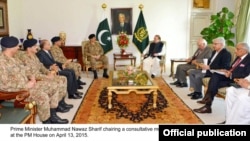Pakistan’s prime minister sought to reassure Saudi Arabia and its Arab coalition in Yemen that his country “does not abandon friends and strategic partners, especially at a time when their security is under threat.”
Nawaz Sharif’s assurance came Monday after a flurry of statements from officials in Arab countries expressing their disappointment at Pakistan refusing to join their coalition.
Saudi Arabia had requested Pakistan for ground troops along with naval vessels and aircraft.
Pakistan’s parliament, after a five-day debate, passed a unanimous resolution last Friday that the country would defend Saudi Arabia’s “territorial integrity” and the Muslim “holy places” of Mecca and Medina if they came under threat, but would otherwise “play a mediating role and not get involved in the fighting in Yemen.”
Several Arab leaders slammed the resolution.
Vehement criticism
Ahmed bin Mohammed Al Jarwan, speaker of the Arab Parliament, which consists of members of the Arab League, expressed his dissatisfaction, according to WAM, the official news agency of the United Arab Emirates.
''The Arab and Muslim people were shocked and disappointed by the Pakistani Parliament decision,'' the agency quoted him as saying.
The minister of state for foreign affairs in the United Arab Emirates, Anwar Mohammad Gargash, sent a series of tweets last week criticizing both Pakistan and Turkey for their “vague and contradictory” positions on Yemen.
He also warned Pakistan of a “heavy price” in his tweets and implied Pakistan was siding with Tehran rather than its Arab allies.
Seemingly in an effort to pacify his country’s critics in the Arab world, Prime Minister Sharif said “their disappointment was based on an apparent misinterpretation of Parliament’s Resolution.”
He also called Saudi Arabia “one of our most important strategic allies” and expressed “firm assurance to our Saudi brothers that we shall stand shoulder to shoulder with them.”
GCC solidarity
Sharif’s statement, while mostly falling within the framework of the parliamentary resolution, adds a couple of new elements. He mentioned solidarity with the GCC states as opposed to only Saudi Arabia. He also expressed support for the “restoration of President Hadi’s government” and has urged Iran to use its “influence to bring the Houthis to the negotiating table.”
This brings Pakistan’s position on Yemen in line with the Saudi position except for the military involvement, according to Dr. Hasan Askari Rizvi, an independent analysts.
But he called this statement just as ambiguous as the original resolution on the key issue of Pakistan’s military involvement.
Several analysts appeared to be grappling with what it meant to “defend Saudi territorial integrity” and whether it included sending troops at some point.
Dr. Rasool Baksh Rais, a professor of political science at the Lahore University of Management Sciences, thought the ambiguity was deliberate.
Prime Minister Sharif used the parliament as a “smokescreen,” according to Rais, to gain time, hoping that diplomacy would work and either Iran would persuade Houthis to come to the negotiation table or Saudi Arabia would reverse Houthi gains and reinstall their guy in the presidency.
“Everybody knew that if he took the issue to the parliament that means he is not taking a decision,” said Rais. “I don’t think that this resolution is binding on him.”
He is constitutionally “free and empowered” to make foreign policy and send forces if he so wished, he added.
Rais also said the government satisfied the opposition by not sending its troops immediately and in return received a resolution vague enough to allow it to maneuver and adjust its policy according to its diplomatic needs.
It is not easy for Pakistan, and particularly the current administration, to say no to Saudi Arabia and its Gulf allies. The Saudi royal family saved Prime Minister Sharif and his family after a 1999 military coup by then army chief General Pervez Musharraf landed him in jail.
Pakistan also has strong economic relations with the region. Several million Pakistanis work in the Gulf Cooperation Council countries and send back billions of dollars in remittances every year to shore up Pakistan’s frail economy.
Saudi Arabia also has helped Pakistan financially in times of need. A “gift” of $1.5 billion last year was crucial in stabilizing the dwindling foreign exchange reserves of the South Asian country. It is also a source for most of Pakistan’s oil imports.
Neighbor relations
On the flip side of things, Pakistan shares a long restive border with Iran. Iran blamed “Pakistan-based” elements for killing eight border security guards shortly before Iranian foreign minister Javad Zarif traveled to Pakistan earlier this month.
The majority Sunni country also has a Shiite population estimated at 15 percent to 20 percent of the total population and cannot afford sectarian tensions while it is trying to bring terrorism under control.
Islamabad also is looking forward to shore up its economic and trade relations with Iran, especially a gas pipeline that can help with Pakistan's severe energy shortage if Iran manages to sign a comprehensive nuclear agreement and sanctions against it are lifted.
The Wall Street Journal has reported Chinese President Xi Jinping will sign a deal with Pakistan when he visits the country later this month to build its side of the Iran-Pakistan gas pipeline. Iran reportedly has completed most of the pipeline on its territory.
According to Rais, “This is the severest of the tests Pakistan faces in terms of its Middle East policy, trying to balance our relations between Iran and Saudi Arabia.”




